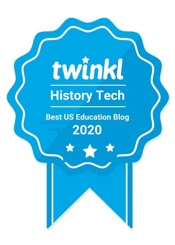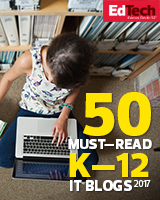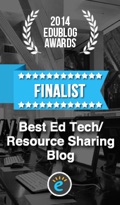Take a nap. Catch your breath. Read a book.

Kori Green, newly installed president of the Kansas Council for the Social Studies, shared a great piece of advice yesterday morning. Over at the KCSS Doing Social Studies site, Kori suggested that perhaps the best thing you can be doing this holiday break is . . . nothing.
Well. Not nothing. She did say that it would be okay to “read a book, spend time with your family, take the dog for a walk . . . Take time for yourself and recharge.” I couldn’t agree more. Teaching has always been difficult and it’s not getting any easier. Some serious mental downtime right about now prepares you for a great second semester.
So if you are actually reading this – I’m guessing most of you have probably already left the building – here’s a bit of some similar advice.
I love the holidays. A Christmas Story, Elf, Home Alone. Chocolate covered coffee beans. Sugar cookies. Lots and lots of sugar cookies. Friends. Family. Christmas lights. Straight No Chaser. It’s all good.
But the best part of the holiday break, of course, is the actual break. So grab a book and make time to actually finish it. Much like my summer list, I try to always have a mini-holiday break reading list.
This year?
I plan on working my way through a couple of books by Daniel O’Malley titled The Rook and Stiletto. Quick overview? A secret James Bond like organization battles to protect England from supernatural beings. Neither of the two have anything to do with education or social studies and, well . . . that’s the idea.
I am convinced that educators must always be on the top of their game. And reading, whether digital or print, content specific or not, keeps us sharp. The research is pretty clear – reading is good for our brains.
“From a lifestyle balance perspective, reading is an essential activity for most people,” says Tom Horvath, clinical psychologist. “It is the most efficient way to learn a great deal of things. There’s value to reading anything because of what reading does for your brain.”
If you’re not into the idea that James Bond needs to battle supernatural beings, I’m okay with that. Definitely feel free picking up a book or two that is social studies related. But find something to read. Hang out a bit at your local library or mom and pop bookstore. Heck. Feel free to drop in at a chain like Barnes and Noble. (And don’t forget to grab the B&B educators discount. Or to ask just about everywhere you shop if they discount stuff for teachers.) And if you prefer digital, there’s lot of online options.
Need a few suggestions other than undercover agents with super powers?
 Hidden Figures
Hidden Figures
“Before John Glenn orbited the earth or Neil Armstrong walked on the moon, a group of dedicated female mathematicians known as ‘human computers’ used pencils, slide rules and adding machines to calculate the numbers that would launch astronauts into space.
Among these problem-solvers were a group of exceptionally talented African American women, some of the brightest minds of their generation. Originally relegated to teaching math in the South’s segregated public schools, they were called into service during the labor shortages of World War II, when America’s aeronautics industry was in dire need of anyone who had the right stuff. Even as Virginia’s Jim Crow laws required them to be segregated from their white counterparts, the women of Langley’s all-black ‘West Computing’ group helped America achieve success in space.”
Coming out soon as a must see movie.
The Undoing Project: A Friendship That Changed Our Minds
“Forty years ago, Israeli psychologists Daniel Kahneman and Amos Tversky wrote a series of breathtakingly original studies undoing our assumptions about the decision-making process. Their papers showed the ways in which the human mind erred, systematically, when forced to make judgments in uncertain situations. Their work created the field of behavioral economics, revolutionized Big Data studies, advanced evidence-based medicine, and led to a new approach to government regulation.”
 March 3
March 3
“A 2016 National Book Award Winner for Young People’s Literature, March 3 is the stunning conclusion of the award-winning and best-selling March trilogy. Congressman John Lewis, an American icon and one of the key figures of the civil rights movement, joins co-writer Andrew Aydin and artist Nate Powell to bring the lessons of history to vivid life for a new generation, urgently relevant for today’s world.”
—–
A quick heads up. During the holiday break, we’ll be re-publishing the Top Ten History Tech posts of 2016. So be sure to drop by in between trips to the Chex Mix bowl. Have a great break!
Trackbacks & Pingbacks
- Top Ten Posts of 2016 #10: Tip of the Week: Teaching Bias, Historical Thinking, & Home Alone | History Tech
- Top Ten Posts of 2016 #9: Jill Weber and historical thinking bootcamp | History Tech
- Top Ten Posts of 2016 #8: “Teaching History Beyond the Textbook” Yohuru Williams and investigative strategies | History Tech
- Top Ten Posts of 2016 #7: 300 sample compelling questions for the social studies | History Tech
- Top Ten Posts of 2016 #6: Integrating technology. Yes. It’s different than simply using technology | History Tech
- Top Ten Posts of 2016 #5: Using evidence and primary analysis worksheets | History Tech
- Top Ten Posts of 2016 #4: Blackout Poetry | History Tech
- Top Ten Posts of 2016 #3: Hamilton the musical: Non-traditional literacy and historical thinking | History Tech
- Top Ten Posts of 2016 #2: 6 C’s to better document analysis | History Tech
- Top Ten Posts of 2016 #1: 3D History: Exploring the World with Virtual Reality & Google Cardboard | History Tech
- Best posts 2017: Where have you been all my life Structure Strips!? | History Tech
- Best posts 2017: Jill Weber and historical thinking bootcamp | History Tech
- Best posts 2017: Tips and Tricks for using Google Expeditions | History Tech
- Best posts 2017: 12 tips and tricks for using music in the social studies classroom | History Tech
- Best posts 2017: BreakoutEDU and student engagement | History Tech
- Best posts 2017: The 10 best social studies sites of all time | History Tech
- Best posts 2017: Fake news is why you exist. 12 tools that can help | History Tech
















Happy holidays, Glenn. I am always looking for a good book.
Rob
Thanks! You too. Happy reading!
glennw
Amen!!
Sent from my iPhone
>